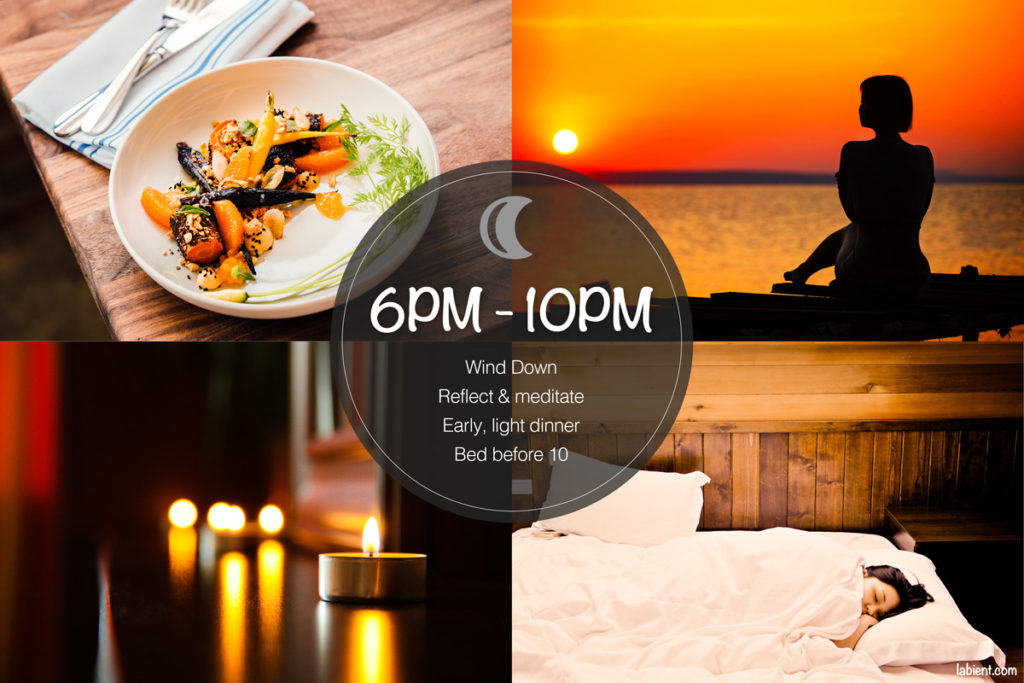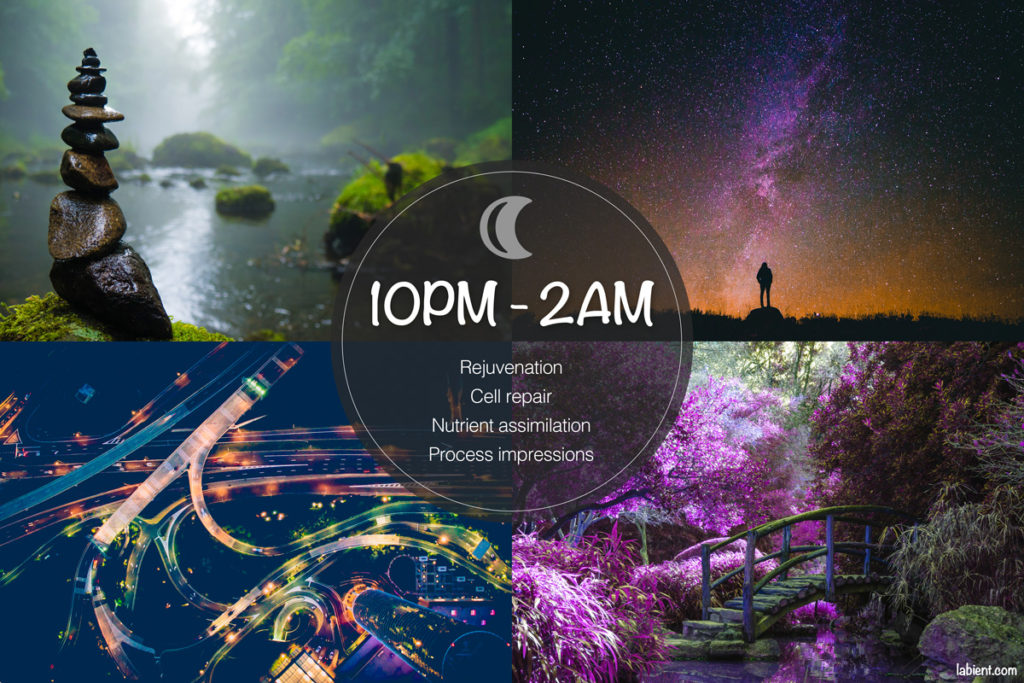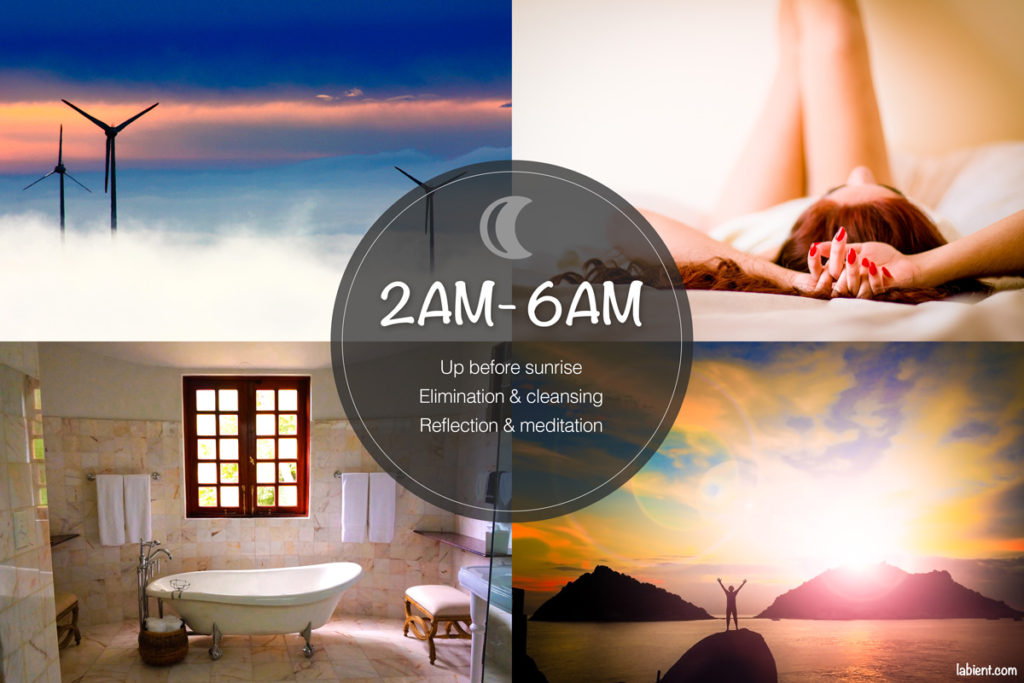Your body has an ideal time for every activity. By learning to live in sync with your body’s internal clock you will improve your performance, health, and well-being.
4:30AM has been my waking up time for over 2 years.
It’s taken several years to adopt this routine, with many setbacks. And I’m still working on it, with ups and downs.
But when I follow my routine it does wonder for my productivity, concentration, and well-being.
The thing is, just because I wake up early, doesn’t mean that I put in more hours into my working day. The boost in productivity happens only thanks to the change in timing.
Timing is everything, and it applies to more than just your wake up time. Your eating, work, exercise, rest, and sleep can take you out of balance if done at the wrong time.
For example, say that you eat a late dinner and go to bed immediately. The food will not get assimilated well by your body and will create toxins.
Your body has an ideal time for every activity. By learning to live in sync with your body’s internal clock you will improve your performance, health, and well-being.
The knowledge of our biological clock is not new. In fact, it’s at least several thousand years old. For example, Ayurveda, the ancient Indian medical science, prescribes what activities you should do during the different phases of the day.
This knowledge is also backed by the modern science. Researchers are studying the circadian rhythms, also called a circadian clock. It’s a 24-hour hormonal cycle that tells your body when to wake up, eat, work, rest and sleep.
Our body clock is a small group of cells made up of unique ‘body clock’ genes. These cells turn on and off and tell other parts of the body what time it is and what to do.
Belle Beth Cooper, Buffer
Nature tells you when to be awake and sleep. In the same way, it has special times for when it’s best for you to eat, think, learn, be active and rest.
The day consists of 6 phases, 4 hours long each, and each phase has certain activities that fit best.
Let’s take a look:
Phase 1: Morning 6AM – 10AM

The sun is rising, and you should be already awake to welcome the day. If you sleep past the sunrise, you may feel tired, heavy and sluggish for the rest of your day.
In the morning, your mind is calm and focused, which makes it a great time to read and learn.
Take this time to reflect and connect to your inner self. If you practice meditation, this is a great time to do it.
Keep your breakfast light. A heavy meal before 10AM can be hard to digest. Your breakfast needs to be warm, especially during the colder months.
Your body may feel a bit heavy and slow. Exercise and other physical activity is beneficial in this phase and will jump start your day.
Morning Activities:
- Wake up before the sunrise
- Connect with your inner self, practice self-reflection and meditation
- Exercise and do other physical work
- Eat a light and warming breakfast
Phase 2: Midday 10AM – 2PM

The time between 10AM and noon is the time of peak performance. At this phase, you have a great capacity to do both physical and mental tasks.
When the sun is at the highest point, your digestion is the strongest. Lunch should be your largest and heaviest meal of the day. Avoid eating in front of your computer or any other work-related activity.
Take a walk after lunch to help your digestion. If you feel tired and sleepy, a nap will help restore the energy for the rest of your day.
Try to avoid active physical labor and exercise after lunch, as you may overheat.
Midday Activities:
- Do the most challenging mental and physical tasks before noon
- Eat the largest meal of the day around noon
- Take a walk or a short nap after the meal
Phase 3: Afternoon 2PM – 6PM

By 2PM, your lunch should be digested, and your body will become light and your mind clear.
Try to reduce intense activities at this phase. If you start to feel tired, take a short nap.
This time is great for absorbing and retaining information. You can also focus on expressive and creative work.
Afternoon Activities:
- Do creative and expressive work
- Read and learn
- Take a short nap if you feel tired
Phase 4: Evening 6PM – 10PM

As the sun sets down, your energy decreases and inertia builds up. It’s time to start winding down from daily activities.
Sunset is a great time for any spiritual practice or meditation. Meditate or do a light yoga practice. Nurture your inner self.
Eat an early dinner, no later than 7pm. A late dinner will stay undigested in your body and will accumulate toxins.
Aim to get to bed before 10pm.
Evening activities:
- Wind down from daily activities
- Take time for self-reflection, meditation, or light yoga
- Eat an early dinner that is easy to digest
- Go to bed before 10PM
Phase 5: Midnight 10PM – 2AM

If you stay awake past 10PM, you have missed out on the natural state of droopiness that helps you fall asleep. Instead, you will experience the second phase of renewed energy. It will be more difficult for you to fall asleep and your sleep may be less deep.
The 2 hours from 10PM to midnight is when you get the most rejuvenating sleep. In fact, those two hours are more important for you health than the hours after midnight. During this time, your body is busy repairing your cells and assimilating nutrients. If you are awake at these hours, you miss that golden opportunity.
Also, sleeping on a full stomach will lead to imbalances in your body. You may get skin rashes, excess mucous production, or disturbing dreams as a result.
Midnight activities:
- Healing, rejuvenation, cell repair
- Nutrient assimilation
- Processing of previous day’s impressions
Phase 6: Early Morning 2AM – 6AM

After 2AM, your sleep will become lighter, as this phase is dominated by movements in nature. Your body is working on cleansing and elimination. To help your body get rid of toxins and waste, you should ensure a bowel movement and cleanse your body.
After your morning cleanse, all the previous day’s residues, both physical and mental, should have settled. Your mind is fresh, and the atmosphere is calm and quiet.
The time leading to sunrise is powerful and is great for any spiritual practice, meditation, breathing exercises, gentle yoga or reflection.
Early Morning Activities:
- Cleansing
- Reflection & Meditation
How to gradually adapt your schedule
The daily routine that I described above is only a generic starting point. You will need to adapt it to your lifestyle and create your ideal routine.
Try to be gentle with yourself and make the changes gradually. If you push yourself to drastic changes, you will stress your system and won’t be able to create a long-term habit.
Final words
I hope this article was helpful and you will adapt some of the tips. If you do, or if you have other thoughts on the subject, please comment below.
Also, you may enjoy reading our guides to zero-waste lifestyle:
- The Definitive Guide to Reducing Food Waste at Home
- How to Go Zero-Waste in the Kitchen: 7 Simple but Effective Steps
- 8-Item Self-Care Routine for a Zero Waste Bathroom
- The Ultimate Step-by-Step Zero-Waste Cleaning Guide
I’ve created this infographic as a quick guide to the daily phases, feel free to pin it for your reference or share with your network:



One comment